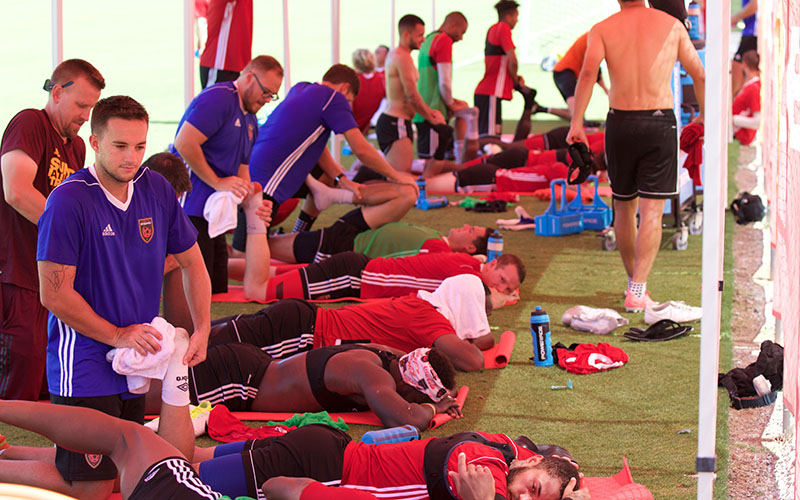SCOTTSDALE — The final whistle blows, bringing another Phoenix Rising FC practice to an end.
Well, almost.
Instead of heading into the locker room, manager Patrice Carteron marshals his team from the practice field to three red tents emblazoned with the club’s crest and begins handing out yoga mats.
In a matter of minutes, the sidelines at the Phoenix Rising Soccer Complex transform into a fully functional yoga studio with Carteron leading pairs of players, coaches, trainers and occasionally even owners in synchronized stretches.
As a former player, Carteron preaches the importance of stretching to his players in order to recover quicker, prevent injuries and prolong their careers.
“I feel like it benefits most guys,” said 35-year-old defender Jordan Stewart. “You see that we don’t get too many injuries.”
When Carteron arrived at Phoenix Rising in June, he didn’t think the club was doing enough.
“I had a feeling that with the physical preparation and recovery, we could do more,” Carteron said.
By introducing half hour stretching sessions to the end of every practice, athletic trainer Brennen Hodge says Carteron is helping his players and their muscles recover for the next day’s training session.
“Post-practice stretching and recovery is important because what you’re trying to do is return the body to a homeostasis so it can heal and regenerate faster,” Hodge said about the body’s process of regulating its internal temperature. “Athletes who are training in high intensity, regardless of the heat, typically have an elevated body temperature and so their body is going to break down for an extended amount of time until it returns to a more normal level.”
Hodge added that stretching at a cooler temperature, which the Rising try to do by escaping the sun, helps to calm down the nervous system and restore the ability to be agile and flexible.
Stretching after practice isn’t a new phenomenon to Phoenix Rising players, but Stewart believes that the team’s previous routine was more social and lacked some of the attention to detail that Carteron has brought.
“I think it’s good,” Stewart said. “I think any soccer player will tell you that they don’t stretch enough if they can get away with it.”
One player who might agree is Stewart’s teammate Matt Watson, who admitted he wasn’t the biggest fan of the team’s new cool-down.
“I personally don’t like stretching,” Watson said. “I don’t know, it’s just not for me. I like to feel my muscles tight (and) tired, but you know that’s what coach wants.”
Assistant coach Rick Schantz said that because of the heat and intensity of practice, some players tend to not want to stay on the field very long unless they’re working with the ball. Despite that, he thought the team has responded well to its new routine.
“They got over it pretty quickly,” Schantz said. “They realized that it does help them to calm down when you finish a session. It’s not just the stretching and increasing mobility, but it’s more the breathing, the relaxing, being in the shade and trying to cool your body down slowly rather than just going right inside.”
In addition to aiding a player’s recovery and flexibility, stretching may also help prevent injuries and in the process, extend careers.
Researchers have come to various conclusions as to the actual effect stretching may have on preventing muscle strains, but Stewart believes that every little bit helps.
“It’s one of those things that even if it’s going to help one percent,” Stewart said. “It’s never going to be a hindering, so if you can add something that can help each of us and help the players perform at a higher level and keep as many people
on the field and in a squad together, then it’s a good thing.”
Even Watson, who turned 32 before the season started, understands why Carteron values keeping a roster filled with veterans limber.
“We have an older team,” Watson said. “I think coach knows that and I think he wants to give us that little extra time to make sure our bodies are right so we come back tomorrow and we’re not pulling hamstrings and stuff like that.”
Some Rising players take their stretching habits more seriously than others in order to stay on the field. In a recent Sports Illustrated piece, club captain Didier Drogba revealed that he stretches for two to three hours a day.
The 39 year old told SI that if he decides to stop playing after this season, it would be because of mental fatigue, not because his body is holding him back.
“I think his stats, where he’s played and the level he’s played at speaks wonders for his dedication to keeping himself healthy,” Hodge said. “He performs at an excellent level for his age and he’s definitely somebody that’s very hard to deal with on the field and he’s able to maintain that status because he’s willing to put in the work.”
Whether it’s Drogba or any other Rising player, Hodge believes that taking 30 minutes out of their day to stretch, take an ice bath and do any extra rehab work leads to longer, more productive careers.
“They see that the more they spend time on this part of their training, the more they preserve their career and the less likely they are to be injured.”
